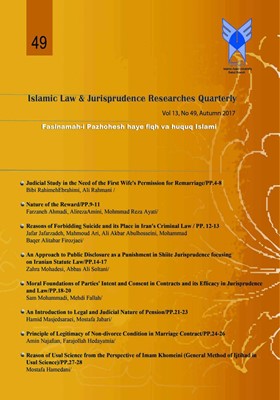Reason of Usul Science from the Perspective of Imam Khomeini (General Method of Ijtihad in Usul Science)
Subject Areas : Private law
1 - Qom University, Qom, Iran
Keywords: Imam Khomeini, Usul science, Usul methodology, reason of Usul science,
Abstract :
Usul science is a knowledge to study reasons of fiqh and to represent the rules of inference in fiqh. But there are very important questions about methodology of Usul science. What are reasons of Usul science? What rules does Usul science argue? Response to these questions explains the foundations of production, development, refinement, critique and evaluation in Usul science. So the current study aims to draw an inference from Imam Khomeini's original works and opinions, so reasons of Usul science can be investigted in a case study from his perspective. In this study, the rules of reasoning are summerized in each problem of Usul science and then common patterns that are subjected to inductive method in these cases are defined. Consequently, general pattern is achieved from methods of Usul reasoning. This pattern has nine reasons: lexical analysis that refers toanalysis of word’s first meaning that comes to mind; conventional analysis comes in 3 forms: rational analysis (rational method), generalization (speech refers to common noun and thing) or performance analysis of conventional masters; innate understanding that does not need theoretical reasoning because it itself is reason; rational reasoning that is argumentation based on philosophical wisdom; narrative reason that includes narratives of infallibles; hybrid reason comes in two forms: rational – narrative reason and rational – literal reason. In addition to extracting this inductive pattern, the current study does not ignore the explanation of each reason’s quiddity, their dimensions and pathological discussion around them.
_||_
1.Algazani, M. (2006). Malem Usul Alfeqh Enda Ahlalsonnat. Beirut: Dar Ibn Alghazi.
2. Ansari, M. (1963). Matareh Alanzar. Qom: Congress.
3. Ansari, M. (1995). Faraed Alusul. Qom: Congress.
4. Behbahani, M. B. (1994). Alfavaed Al-Haeryeh. Qom.
5. Hur Ameli, M. (1988). Vasaeel Alsheea. Qom: Alolbayt.
6. Ibn Edris, M. (1989). Alsaraer. Qom: Islamic Press.
7. Imam Khomeini, R. (1956). Javaher Alusul. Tehran: International Affairs Department.
8. Imam Khomeini, R. (1994). Manahej Alvsul Ela Alusul. Tehran: International Affairs Department.
9. Imam Khomeini, R. (2000). Albeye. Tehran: International Affairs Department.
10. Imam Khomeini, R. (2002). Tahzib Alusul. Tehran: International Affairs Department.
11. Imam Khomeini, R. (2005). Alejtehad Va Altaglid. Tehran: International Affairs Department.
12. Imam Khomeini, R. (2002). Alesteshab. Tehran: International Affairs Department.
13. Khonsari, M. (1956). Manteqe Suri. Tehran: Agah Press.
14. Khorasani, A. (1985). Kefayatol Usul. Qom: Aal Bayt Institute.
15.Mozaffar M. R. (1996). Usul Alfeqh. Qom: Islamic Press.
16. Meshkini, A. (2008). Alhashyeh Ala Kefayatilusul. Qom.
17. Najafi, M. H. (2017). Javaher Alkalam. Beirut: Dar Alehya Altorath Alarabi.
18. Qomi, A. (2008). Algavanin Almohkameh. Qom: Islamic Press.
19. Sobhani, J. (1963). Rasaele Usuleyeh. Qom: The Institute of Imam Sadiq.
20. Tousi, M. (1996). Aloddeh. Qom: Alolbayt.


